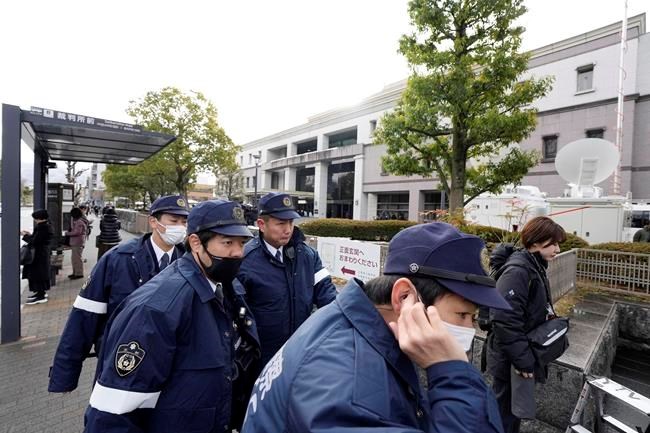TOKYO (AP) ŌĆö A Japanese court sentenced a man to death after finding him guilty of murder and other crimes Thursday for carrying out an arson attack on an anime studio in Kyoto that killed 36 people.
The Kyoto District Court said it found the defendant, Shinji Aoba, mentally capable to face punishment for his crimes and announced the sentence of capital punishment after a recess in a two-part session on Thursday.
Aoba stormed into Kyoto AnimationŌĆÖs No. 1 studio on July 18, 2019, and set it on fire. Many of the victims were believed to have died of carbon monoxide poisoning. More than 30 other people were badly burned or injured.
Judge Keisuke Masuda said Aoba had wanted to be a novelist but was unsuccessful and so he sought revenge, thinking that Kyoto Animation had stolen novels he submitted as part of a company contest, according to NHK national television.
NHK also reported that Aoba, who was out of work and struggling financially after repeatedly changing jobs, had plotted a separate attack on a train station north of Tokyo a month before the arson attack on the animation studio.
Aoba plotted the attacks after studying past criminal cases involving arson, the court said in the ruling, noting the process showed that Aoba had premeditated the crime and was mentally capable.
ŌĆ£The attack that instantly turned the studio into hell and took the precious lives of 36 people, caused them indescribable pain,ŌĆØ the judge said, according to NHK. During the trial, Aoba told the victims' families that he was sorry, but he did not show sincere regret or face their sufferings fully, and there was little hope for correction, the ruling said.
Aoba, 45, was severely burned and was hospitalized for 10 months before his arrest in May 2020. He appeared in court in a wheelchair.
His defense lawyers argued he was mentally unfit to be held criminally responsible.
About 70 people were working inside the studio in southern Kyoto, JapanŌĆÖs ancient capital, at the time of the attack. One of the survivors said he saw a black cloud rising from downstairs, then scorching heat came and he jumped from a window of the three-story building gasping for air.
The company, founded in 1981 and better known as KyoAni, made a mega-hit anime series about high school girls, and the studio trained aspirants to the craft.
Japanese media have described Aoba as being thought of as a troublemaker who repeatedly changed contract jobs and apartments and quarreled with neighbors.
The fire was JapanŌĆÖs deadliest since 2001, when a blaze in TokyoŌĆÖs congested Kabukicho entertainment district killed 44 people.
Chief Cabinet Secretary Yoshimasa Hayashi said the Kyoto Animation attack was ŌĆ£a highly tragic caseŌĆØ and that the government has since stepped up restrictions on gasoline sales, including mandatory identification checks of purchasers. Hayashi, however, declined to comment on the death penalty ruling.
Japan has maintained the death penalty despite growing international criticism. Justice ministry officials say it is a justified response to continuing heinous and violent crimes. A survey by the Japanese government showed an overwhelming majority of the public supports executions.
Executions are carried out in high secrecy in Japan, where prisoners are not informed of their fate until the morning they are hanged. Since 2007, Japan has begun disclosing the names of those executed and some details of their crimes, but disclosures are still limited.
Mari Yamaguchi, The Associated Press



